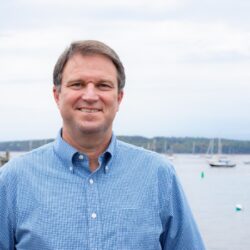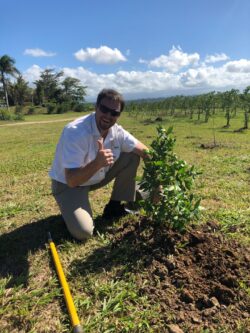5 Questions with Dr. Anthony Chatwin
A Q+A with Rare's First VP of Science & Impact

What inspired you to work at Rare?
I think what sets Rare apart, aside from our work in communities, is the groundwork for collecting information in the field. I’ve been really impressed with how much information our teams in different countries collect and then feed into the organization so that we can understand whether we’re having an impact. And to me, it’s really important that Rare’s culture is science-based. So, when the job appeared, I thought, wow, that would be great! I’m passionate about fishing communities and science. It’s a perfect marriage.
What does sustainability mean to you?
Deep down, I think sustainability means harmony. It is living in harmony with nature’s ability to sustain us. It’s like the Holy Grail; It’s very hard to find and achieve. These communities that [we work with], we are helping them find ways to continue to live off the resources to make ends meet but within a conservation constraint. And yeah, it’s a struggle. Sustainability has to be an ongoing commitment so we can leave some of these key resources in the water.
You were born and raised in coastal Brazil, and you’ve lived in the UK, Portugal, and Maine, US. What have you loved most about living in these diverse coastal communities?
I love this question. The ocean is where humans don’t have a choice but to interface with nature. Even if you are in a big metropolis by the coast there is that boundary between land and water where we don’t have control. It’s Mother Nature out there, and I like that exposure. If you think of terrestrial systems, like forests, we convert them into cities, and if you live in the city, you need to travel a bit to go and experience the wilderness whereas you step in the water right off the beach, and there are all sorts of other forces that you have no control over.

What has been your greatest adventure?
In 1996, I sailed around the world, and spent 10 months in a yacht race. The race started in Southampton, England to Rio, and around the horn to Wellington, New Zealand, to Sidney, Australia, to Cape Town, South Africa, to Boston, and then back to Southamption. It is going around the world the wrong way, against the prevailing currents. It was amazing for my career as an oceanographer.
Normally, we will go on a boat for two weeks, collect data, come back, and spend 50 weeks in the lab looking through it. So, the opportunity to be at sea and see the dynamic of the ocean and how it changes and recovers…that’s a perspective you can’t get in the lab.
Who inspires you?
What has really inspired me ever since I was a kid, were the self-reliant and hardworking people around me. To me, being inspired means you want to emulate that. I was just always impressed with people who did what it took to get what they needed. For example, in Brazil, there’s a lot of income inequality. But people in the fishing communities were always happy and were building their lives in the best way they could. It’s that ethic that I have always really admired. I found that many of my closest friends and people I wanted to spend time with have that.